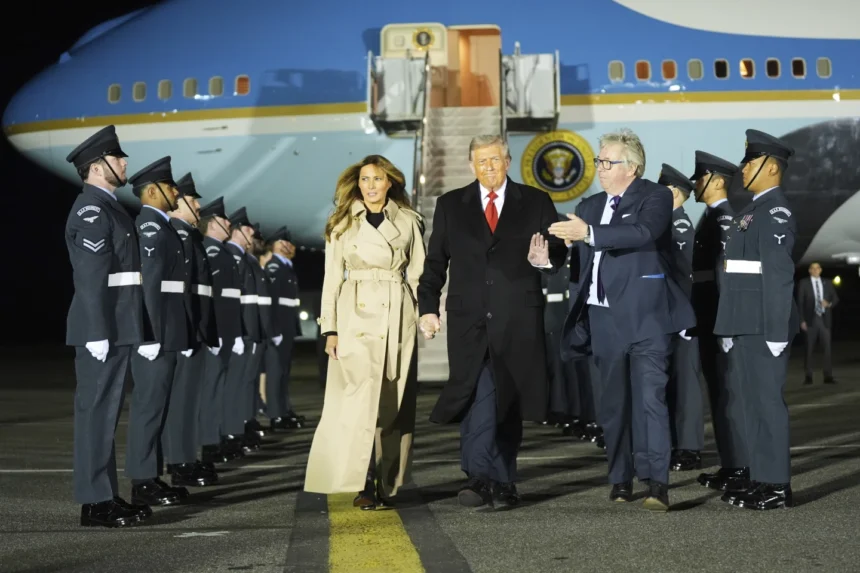U.S. President Donald Trump and First Lady Melania Trump have arrived in the United Kingdom for a two-day state visit, making Trump the first U.S. president to be invited for a second state visit to Britain.
The trip, filled with royal pageantry and political negotiations, comes at a crucial moment for both nations, as they seek to strengthen economic ties and address differences over Ukraine, the Middle East, and global security.
A Royal Welcome at Windsor Castle
Trump and the First Lady landed at Stansted Airport, where they were greeted by Viscount Hood, Lord-in-Waiting, before heading to Windsor Castle. King Charles III will host the U.S. president with a formal banquet and full ceremonial honors, including horse-drawn carriages and military parades.
Calling the monarch an “elegant gentleman,” Trump emphasized his long-standing admiration for the British royal family, recalling his previous stay at Buckingham Palace during an earlier state visit.
Talks with Prime Minister Keir Starmer
On Thursday, Trump will hold discussions with Prime Minister Keir Starmer at Chequers, the official countryside residence of British leaders. The agenda includes:
- Finalizing a multibillion-dollar technology partnership, with major investments expected in AI data centers, life sciences, and nuclear energy.
- Expanding defense cooperation and financial sector ties.
- Continuing talks on a trade agreement following reductions in U.S. tariffs on British auto and aerospace industries.
Political Challenges for Starmer
The visit coincides with domestic turmoil for Starmer’s Labour government, following the dismissal of Britain’s ambassador to Washington, Peter Mandelson, over ties to Jeffrey Epstein. Recent resignations of key officials have further weakened Starmer’s standing, just 14 months after his landslide victory.
Despite political headwinds, Starmer has managed to cultivate warm relations with Trump, describing him as a “friend,” while Trump acknowledged that the prime minister is “slightly more liberal than I am.”
Ukraine, Gaza, and Global Tensions
Foreign policy differences remain. Starmer has urged the U.S. to maintain support for Ukraine, while Trump has downplayed recent Russian drone incursions into NATO airspace, calling one incident “possibly a mistake.”
The two leaders also diverge on the Middle East, as the U.K. prepares to formally recognize a Palestinian state at the United Nations later this month, a move not backed by the U.S.
Despite differences, analysts say the visit is crucial for both leaders: Starmer seeks to project statesmanship, while Trump embraces the grandeur of his second term and the symbolism of a renewed trans-Atlantic partnership.







